John Walter Thomas
There were only seven of them, only seven librarians in the period 1860 to 1974, when local government went through a great upheaval, 114 years which saw the creation and growth of public library services in Blackburn. W A Abram got the ball rolling in 1860, then came David Geddes, Richard Ashton, James Hindle, J Walter Thomas, W W Yeates and J B Darbyshire – the ‘magnificent seven.’ During the coming year Cottontown will look at the lives and contributions of each one in turn. We’ll start with perhaps one of the less well known names – J Walter Thomas.
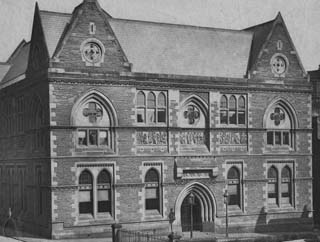
John Walter Thomas was the son of Richard and Sarah from Shropshire. Richard was a railway worker, who settled in Blackburn, where Walter was born in 1890. The family lived in Selborne Street at number 26. Walter was educated at the old Parish Higher Grade School and joined the library service in 1904. At the time the library was in Library Street and Richard Ashton was in charge. The ‘closed access’ system was in operation, which meant borrowers had to queue at the counter and ask library assistants to get books for them. There was agitation in the papers for Sunday opening to be introduced, and a junior assistant would be earning 25p per week.
When the First World War broke out Walter Thomas joined the 4th East Lancashire Regiment.. In September 1914 the troops were carried by train to Southampton where they embarked on the troop ship Deseado bound for Alexandria. They were stationed at Cairo that winter, digging trenches, undertaking route marches, being thoroughly trained and drilled to face the trials ahead. The following May they sailed for Gallipoli. It was a difficult landing; the Turks occupied strong defensive positions, the terrain was cut up by ravines and there were no roads. By the middle of the month however the 4th East Lancashires were established in trenches.
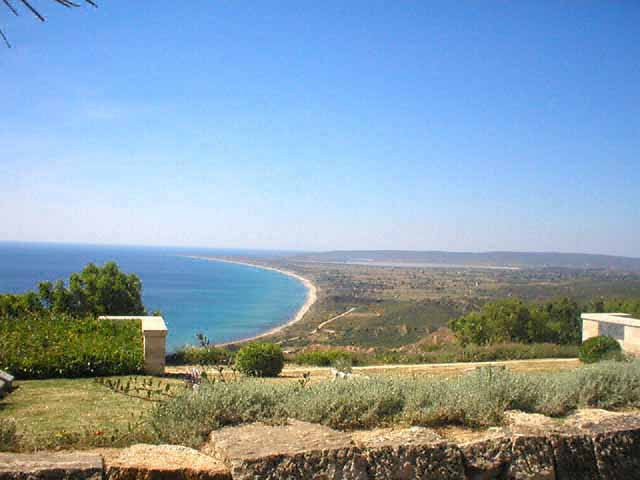
Conditions were bad, with stifling heat and plagues of flies, attracted by the unburied dead in no-man’s land. There was inadequate food, insufficient water, and poor sanitary arrangements. Dysentery flourished. To make matters worse there was no real shelter from the Turks, and the danger from snipers was ever present. Both sides mounted attacks and both sides defended gallantly. A stalemate was reached and the British decided to withdraw. At a cost of over 120,000 British casualties, 7500 New Zealand casualties and 26,000 Australian casualties nothing had been gained.
How peaceful it must have seemed for Walter Thomas, when he returned to work in the library, how soothing the silence; the gentle lap of turning pages replacing the screaming of shells and rapid rifle and machine gun fire. The peace was short-lived however – great changes were afoot at Blackburn Library. Soon the old building echoed to the sound of hammers and saws. Blackburn was adopting the open-access system, and the shelves and counters were being rejigged. Previously the library had been in effect a warehouse, with tall shelving accessed by staff using ladders. This would not do for public use and from this point on the inadequacy of the building began to be obvious.
The depression of the 1930s and consequent unemployment saw increased use of all the library's departments - lending, reference and reading room. Richard Ashton, who was approaching retirement, pressed his committee hard for an extension to be built on the site occupied by the Borough Arms. Plans were drawn up. James Hindle became Librarian in 1938. At the same time Walter Thomas, who had been the cataloguer was appointed Deputy Librarian. The outbreak of war in 1939 put an end to all hopes of an extension. James Hindle retired in 1945 and Walter Thomas succeeded him. This was a crowning achievement, but it probably didn’t mean much to him; his son Gordon had been killed in 1943 at the age of 20 while serving in the RAF.
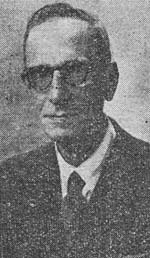
Shortages and post-war austerity meant there was no prospect of a new library or, an extension to the old one. Walter Thomas was a keen bibliophile, with a good knowledge of early printed books. In these difficult times he applied this knowledge and his cataloguing skills to the organisation and recording of the Hart Collection of coins and books, bequeathed in 1949. He was awarded fellowship of the Royal Numismatics Society for the work. In addition to his interest in coins, Walter was a skilled craftsman, making most of the furniture in his home, and a number of violins. He was also a collector of pottery, silver and 18th century drinking glasses.
Walter Thomas retired in June 1954. His period as Librarian had been a difficult one with shortages of books, staff and funds. The reading habit too seemed to decline in the post-war years and the early 1950s. Television, suspended during the war, was back and was seen as a threat to books. Walter devoted his retirement to his many hobbies, particularly violin making. He followed the Stradivarius pattern. He also made the bows and learned how to play. He died in October 1966. He was living at Nares Road at the time. His successor WW Yeates praised his work and his service to the town and said J W Thomas's proudest moment had been when he and his wife Mary attended the unveiling of the Commonwealth Air Force Memorial in Malta, where his son had died.
From gamekeeper to Chief Librarian might seem an unlikely step, but David Geddes was a man of many talents. He was born in Thurso in Caithness, Scotland’s most northerly town, with origins dating back to Viking times when it was an important Norse settlement, the major gateway to mainland Scotland. It later grew to become a market town, trading with Scandinavian and Baltic ports from as early as the 14th century.
That David Geddes received a sound education is amply evinced by the erudition and scholarship he demonstrated as Blackburn’s Librarian and Curator, but little is known of his early life and we first encounter him as head gamekeeper, gardener and forester for Sir John Sinclair of Caithness. In 1864 Geddes came to Blackburn as head gamekeeper for Joseph Feilden at Witton Park.
In 1867 W A Abram resigned as Librarian and Geddes applied for the position, being selected out of a field of 94 applicants. Geddes was a tall, powerfully built man, a descendant of the ‘Thier-nan-more,’ the ‘Great Chiefs,’ the regiment of Highlanders raised by Sir John Sinclair of Thurso Castle, Privy Councillor and First Baronet. At the time of his appointment the library was in the Assembly Rooms in the Cotton Exchange. Geddes’ first priority was to find new premises.
The town’s Library Committee searched for a suitable site for a new library and eventually chose one in Richmond Terrace. The council acquired the houses and gardens already on the site. The foundation stone was laid on July 11th 1872 and the building opened on June 11th 1874. Among those who attended the ceremony were William Gladstone, the Earl of Derby and the Bishop of Manchester.
Geddes became an expert on the geology of the Ribble Valley and a keen antiquarian. His years as a gamekeeper and gardener had instilled in him a love and knowledge of wild life and botany. He became Secretary of the Field Naturalists’ Club. He was a promoter of further education and lent his support to the proposal to build a Technical College. He was a Liberal and attended St George’s Presbyterian Church. He was a champion of the poor, raising money for meals for the children of poor operatives.
Geddes was married to Jessie, also from Scotland and their children John, Maggie and Jessie were also born there. Their subsequent children Ada, Jemima and Maud were born in Blackburn. They lived in Altom Street. In October 1889 Geddes was noticeably ill and had to leave work early on a number of occasions. On October 22nd he arrived home, went to wash his hands in the back room, uttered a cry and collapsed. By the time Jessie arrived at his side, he was dead. He was just 54 years of age.
'Walter Yeates is almost the prototype of a Town Hall official . . .but beneath the formal attire, the shrewd, terse, slightly ambiguous manner, and the highly qualified speech . . .there beats a heart of pure, sentimental gold. To strike this gold one really needs to drive a few miles north-west of Blackburn to his stone-roofed cottage in the village of Mellor, to take high tea (fresh pullets' eggs and oatmeal cakes) with him and his attractive wife Alice.'
Thus was WW Yeates described by Wilfred De'Ath in his book on Barbara Castle. He was born in Preston, the son of a mechanical fitter, won a scholarship to Preston Grammar School and became a junior assistant at Preston Library when he was sixteen. In 1936 he obtained a diploma at Manchester School of Technology and became a Senior Assistant Librarian at Plymouth, where he remained, with a spell in the RAF during the War, until 1954 when he came to Blackburn as Borough Librarian, Curator, Public Relations Supremo, and Director of Culture and Entertainments.
WW Yeates combined the qualities of the Victorian man of learning and culture with the modern dynamism of a manager of public services. From his very first annual report, in 1954, it was clear that he was determined to raise the profile of the library and make great changes. He noted for instance that the reference department, apart from upgraded lighting, was essentially the same as it had been in 1908 and that its use was not at the level that would be expected in a busy, industrial town. His staff wouldn't have needed to wait for the appearance of the annual report however to realise that a force for change had arrived.
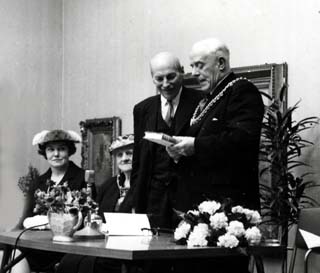
The Library had an internal phone system and when WW Yeates was on the line a red light buzzed angrily. Many a junior assistant fled rather than pick up. He expected his staff to jump to it. He expected them to to jump to it when dealing with the public too - failing to provide prompt, polite, efficient service was not an option. He put the Library first. Often he would return in the evening to make sure all was well. Often he was there on Saturday mornings keeping his staff up to the mark. He would scrutinise the work of staff sorting shelves, and any misplaced volumes would be pulled out and presented to the quaking culprit. Despite his irascible manner, he was always ready to offer sympathy and help when it was needed.
The change that WWY most wanted to effect was one to new central premises. In the meantime, in 1959 a remodelling of the lending department was carried out. At the time former Prime Minister Earl Attlee was president of the Library Association and accepted an invitation to come and open the refurbished library on April 10th. When Blackburn's old town centre was swept away in the 1960s WWY hoped a new library would be included in the plans for the shopping centre. He correctly foresaw that this would be beneficial not only for the library but for the new development, giving it a cultural, non-commercial dimension. Unfortunately his views were not shared. By the time the prospect of a new library, albeit in the old Co-op, was in prospect it was time for WW Yeates to retire, time for him to devote himself to his family and his favourite recreation - fishing.
back to top
William Alexander Abram was born in 1835 at Lydiate near Ormskirk where his father, the Rev Robert Abram, was an Independent Minister. He was a pupil at the Congregational ministers' school at Wakefield and later joined his family at Silk Hall in Tockholes, where his father was a Minister. He became apprenticed to the Church Street printer John Neville Haworth and learned to be a compositor. He spent some years in London in one of the Capital's principle publishing houses, returning to Blackburn to pursue a career as a journalist.
It was fear of the mob that persuaded those in authority to do something about the social conditions of the working people. Industrial towns had mushroomed, huge areas of poor housing had been constructed with no provision for recreation, no parks, no open spaces, no playgrounds. The countryside was out of bounds, guarded by gamekeepers. The only resort, the only escape was the public house. Drunkenness was widespread. The drunken mob was seen as a potential threat to ordered society. The correctives of severe punishment and punitive working hours had failed. It was time to try improving social conditions.
Public libraries, along with public parks, reduced working hours and improved access to education were introduced to the industrial towns of the North and the Midlands in the second half of the 19th century. Blackburn achieved borough status in 1851 and shortly after adopted the Public Library Act. Councillor and lawyer Tom Clough was the driving force behind this initiative, though it was to be some years later before a library was established.
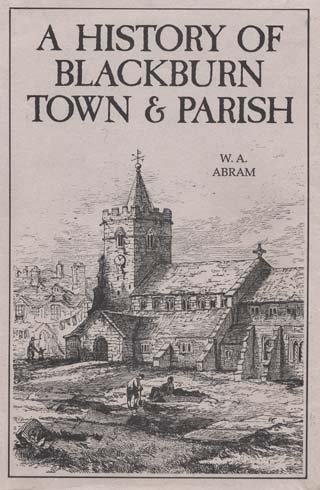
On the 3rd of April 1860 the newly established Free Library Committee appointed WA Abram Librarian on a salary of £1 per week. He remained in that capacity for seven years, nurturing the library in its formative years and laying sound foundations for the future. In 1867 he left the post to become editor of the Blackburn Times, though he retained his interest in the work of the library, becoming Chairman of the Committee. He was a councillor for St Paul's ward for many years and a Justice of the Peace, but is best remembered for his books: the Monumental 'History of Blackburn' and the biographical work, 'Blackburn Characters of a Past Generation.'
In 1861 Abram married Elizabeth Birtwistle. They had four boys. Two died in early life, of the others, one became sub-editor of the Hull Daily Mail and the other joined the Manchester and County Bank at Darwen. William Alexander Abram died on May 2nd 1894.
Set against him was another William, William Thomas Ashton. He was born in Blackburn in 1832 and came to Darwen at the age of fifteen to work first at Brookside Mill, then as cashier at Bowling Green Mill and then as manager of Eccles Shorrock's mines at Dogshaw Cough and Entwistle Moss. He knew the moorland footpaths well, taking orders from farmers and other customers. When Duckworth's gamekeepers blocked his way, he unblocked it. When they erected more substantial barriers, he went for his saw.
One Man's Sunday. (Radio Blackburn, July 31st 1977)
Esme Parsons, Music Librarian at Blackburn Central Library, interviwed by Guy Goodall.
Born in Somerset, Esme studied at the Royal College of Music. She taught in schools for four years, and has recently written a musical. She joined Blackburn Library after seeing the post advertised in a newspaper. During the interview Esme mentions how patients from Brockhall hospital had visited the Music Library and listened to music through headphones, something they had never done before. Following requests from Blackburn's newest residents, Esme built up the Library's collection of Indian Music.
A member of Amnesty International, Esme says on leaving the Royal College of Music she was a "terrible music snob", but now enjoys all forms of music. Her greatest satisfaction derives from making music with children.
By kind permission of Radio Lancashire.
Article and digitisation by David Whalley.

